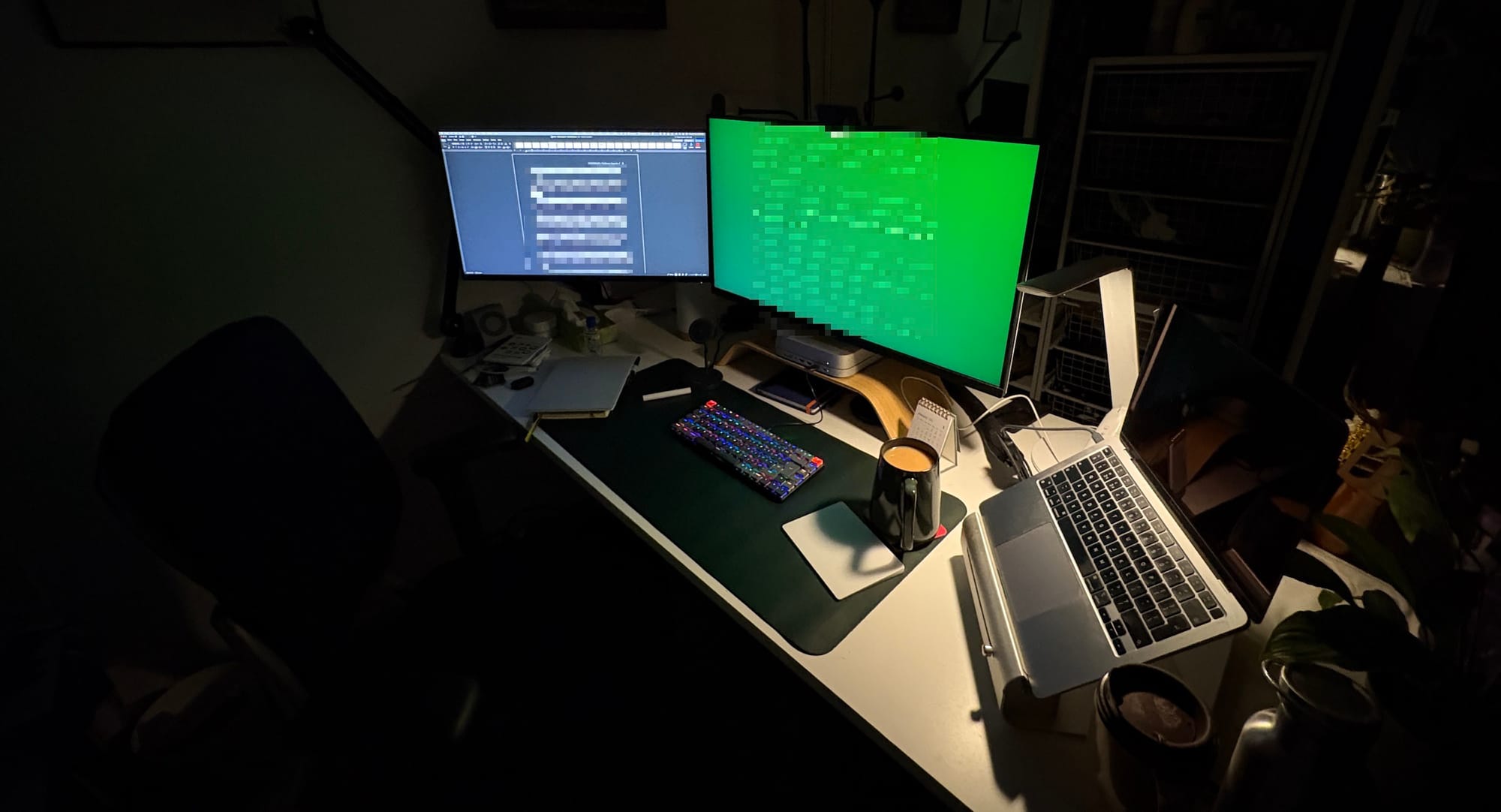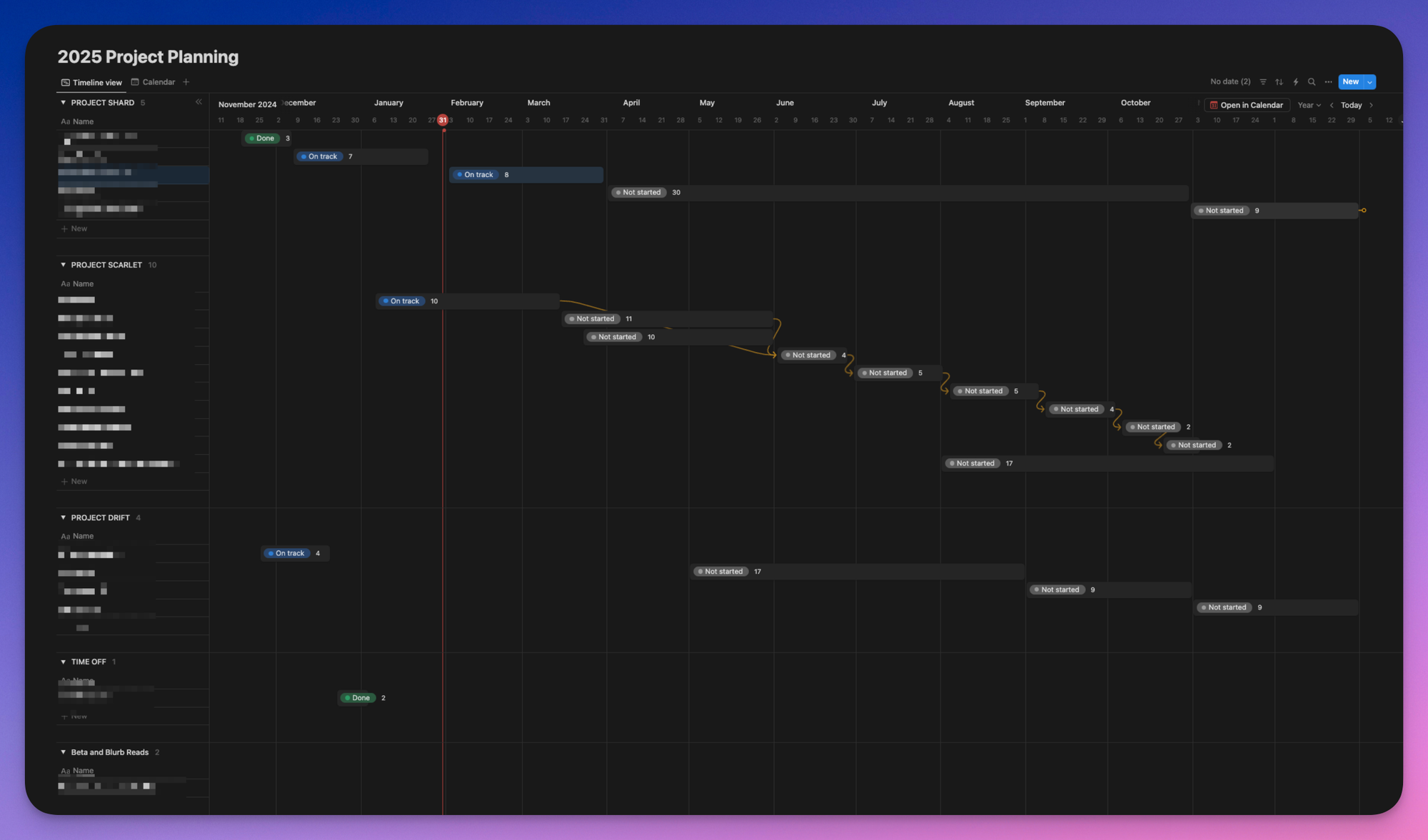Daily writing routine - February 2025
What's new, what's different and what's stayed the same.

It's been just shy of two years since I last wrote a long blog post about my writing routine. After I responded to a reader asking how, exactly, you 'make yourself write', I realised I was long overdue for an update. Because things have changed. Not a lot, in some ways. But fairly fundamentally in others.
Caveat Writer
One thing that hasn't changed is the up-front caveat. Just like in 2023, this is what's working for me, right now, in February 2025. It's not a prescription for success, a guide, a sure-fire-can't-fail strategy or anything else of that ilk. Anybody who tells you they have a one-size fits-all method that will give you the writing career of your dreams is a) talking total bollocks and b) very likely trying to take your money.
What this post is though, is an example. Examples are good, because you can read them, think about what may or may not work for you and, crucially, you can read lots of them. There's a lot of unspoken foundations under this routine (although I will speak about some of them in this significantly-longer-than-last-time post). Your foundations may be different, or in some cases and for some factors not exist. Just like me, you'll have to work with what you've got. And I hope with this example and the other things you'll find out there in books and blog posts and podcasts, you'll piece together something that fits with the way your brain, time, energy, constraints and goals hang together.
It's also, fair warning, quite long, because I dig into things in a lot more detail.
With that said, let's review the lay of the land.
All (not quite) change
Some things in my life haven't changed much. I live in the same place, doing the same day job. I have much the same preoccupations and enjoy many of the same leisure activities. I still like to go out walking whenever I can.
However, viewed from 2023, the year 2025 sounds both impossibly futuristic and looks like a very different place. Since I wrote my last writing routine post, I've completed three novels and I'm on the way to finishing a fourth. I've had a book published and optioned for TV, been to a bunch of book festivals, survived my first encounter with the project timelines of actually putting a physical book together, sat in a warehouse signing a giant stack of books, been on a bunch of podcasts and even appeared on a drivetime radio show in the US. It's been... a lot.
The main impact of everything above is that the pie chart of my life is now split differently. I used to have three segments. The first was being a functional human being - a good husband and son and brother and uncle, hoovering, loading and unloading the dishwasher, watching a bit of telly, trying to stay relatively fit and healthy. You know, regular human stuff.
The second pie segment was keeping a roof over my head by doing my day job. I'm very lucky that I have a day job I enjoy with people I like, doing interesting stuff. And while it involves a bit of travel, it has predictable, stable hours and manageable workloads.
The third was writing. At the time, that just meant producing books. From 2021 onwards, it meant producing books to send, ultimately, to my agent, hopefully to sell. And from early 2023, only a month or so after my first writing routine post in fact, it meant producing books for my agent AND my editor.
So now, I find my life is split into four segments. Being a human, doing my day job, writing and, now, a continuously growing and shifting segment called 'publishing'. When people ask me to explain the difference, I tell them writing is 'being a writer' - doing the words, in whatever shape that takes. Whereas publishing is 'being an author', which is everything else related to having my books out in the world. These are two linked-but-actually separate jobs. And 'being an author' is a significant new challenge, with time-intensive ancillary not-writing tasks, like reading proofs for blurbs, newsletters, blogging, chairing events, giving talks, running workshops, pitching and recording podcasts, invoicing, project planning and so on. Much of this is, strictly speaking, optional, but it often doesn't feel that way. It's also very easy to launch yourself at this stuff, over-commit and end up really struggling to find time to do the only actually required activity, which is writing the bloody books.
Before I had a book of my own out, I often wondered why many, many writers drastically slowed their writing pace after their first couple of books. And, wow, I have found out why, as I talked about in my 2024 numbers roundup. When you get this new second job of 'publishing stuff' (or third job, in some cases), it often takes time from the only bit of your life that has any flex, which is writing time.
So, in this changed landscape, with these new challenges (challenges I'm very happy to have, I might add), my writing routine has become vastly more important to me, because it's the bulwark and foundation on which the entire enterprise rests. If I don't write the books, the rest of it doesn't happen.
2024 was the year that my writing routine almost-but-not-quite failed. I showed up, I made some words, but my efforts were scattershot, not very well planned, easily derailed and I spent more time than I like to think about just faffing. On the plus side the cold, hard numbers of last year gave me a bit of a wake-up call, and I launched into 2025 with a far better plan and a new commitment to the routine.
So what does it look like now?
The routine
I write five days a week on a 'usual' week, for 90 minutes, from around 06:00 to around 07:30. I say a 'usual' week because when there's a deadline looming (a new thing since 2023) I sometimes write in big weekend blocks too. I will also sometimes write in the evenings when I'm travelling for work or publishing events (although I tend to use this time more often for writing-adjacent stuff like this blog). But I'd wager 80-90% of my drafting and editing is done in my regular Monday to Friday writing sessions.
I get up at 05:30, which very often elicits quiet gasps of horror from interviewers and writing friends. Trust me, I too am horrified. It's not that it's hard, per se. I'm very, very used to it, having done it the vast majority of working days since 2019. And I have the furry assistance of my very well-trained cat Olaf, who usually appears at precisely 05:29 with a polite and very quiet miaow, followed by a stern bat to the face with barely-sheathed claws if I'm still horizontal at 05:31.
But, believe me, if I'm ever lucky enough to go full time as a writer, the absolute first thing I will do is shift my entire routine by at least two hours. I like aspects of being up so early. It's very, very quiet, and I quite often get out for a walk as the sun is rising in the winter, which is a lovely way to start the day. And of course there is a society-wide bias towards early risers which sees them as more virtuous and hard-working. While I benefit from that bias, I don't agree with it. Plenty of people work hard who don't get up at the crack of dawn. I'd be getting the extra sleep if I had any other option (more on that below). If I'm left to my own devices and I'm not fitting the daily writing around the day job, I'd prefer to go to bed later and get up 2-3 hours later. But, right now, this is the time that works, so this is the time I get up.
I shower, dress and get a big cup of tea while I feed the cats. I try not to look at anything online before the words are done. I'm not 100% at managing this, but every morning that I do, I'm noticeably calmer and more productive. Weird how that works.
Once the tea is brewed, I climb up the stairs, close the office door and get cracking. My phone goes on the other side of the room, connected to my headphones via Bluetooth so I can put on music. I listen to a lot of ambient music, action movie soundtracks, jazz, lo-fi beats, you name it. I cycle through a lot of different playlists.
Here's what my desk looks like now:

Thanks to a new computer for my wife, I’ve re-inherited the old monitor I’d given her to use with her laptop, so I now have two monitors plus a laptop screen if I need it, which helps immensely when I am doing timeline-intensive stuff, referring to research or checking my outline. But I’m still, despite the number of screens, very much dark mode everywhere and lights as low as I can get them. I write (and edit) mostly in Scrivener’s composition mode with the text size dialled way up, which helps me to focus on one sentence or paragraph at a time.
I often get started by skimming the previous day's work and doing a light line edit, which takes maybe 5-10 minutes and gets me rolling without having to stare at a blank screen. Then, ideally, I take a quick look at the next scene’s micro-outline (which is 4-6 bullet points telling me what the scene needs to do that I wrote a few days before) and get writing.
It sounds deceptively simple, that ‘get writing’. When I first started trying to write regularly, actually starting to type sometimes felt like an insurmountable obstacle. I was always worried that if I started with a crap sentence, I’d somehow doom the whole day’s writing, often resulting in me not actually starting at all. These days I’ve written and cut literally millions of words, so I know, deep in my bones, that I can write a terrible opening sentence and it really doesn’t matter. The shape of the scene will emerge from the draft and I’ll edit or cut that opening line later. But you need the scene to exist first. So just write the shitty first sentence, then another one, then another one. You'll get rolling faster than you think you will.
After 90 minutes, an alarm goes off and I often blink and emerge from a kind of fugue-state. That’s the ideal, because it means I was properly in flow. I’ll peek out of the window and if it’s raining heavily, I will make a soft hiss of delight, then go downstairs, make another cup of tea, then get in another hour of writing.
However, most days, it’ll be dry, so I’ll go and get my jacket on, pop my hat and gloves in my pockets and swap my smartphone for a Nokia (for emergency calls and reporting sheep stuck in fences - I live in the country) and my digital voice recorder, then head out for my morning walk. While I sometimes can’t really be arsed going out for a walk, that feeling fades by the time I’m a dozen steps from my house. More on the walking below.
But that's the core of it - 90 minutes of writing, five days a week. That's the MAXIMUM I can sustainably manage in the mornings if I want to go out for a walk as well and don't want to get up at four in the morning. I'd love to write probably double that, and occasionally do when I'm on a deadline, but I've learned over the years that writing PLUS a morning walk is the best combination for me, given the constraints of having a day job.
The routines around the writing
This is where I reveal just how staggeringly dull and focused my day-to-day is. It doesn't feel particularly dull to me. I really like it. But it sure isn't for everyone. As noted above, when we moved out to the country in 2020, I started walking every weekday morning that I could manage it. At the same time, I noticed that my writing productivity and consistency went way up. For a while, early on, I did the walk first, then sat down to write. But I found that using the daily walk as a post-writing decompression chamber for my brain and a chance to step away from my desk before starting my day job made a phenomenal difference to my mood and energy for the day.
I carry a digital recorder and occasionally work out thorny plot stuff by nattering into it. And once a week on a Friday, I just ramble into it about everything that's going on in the publishing side of my life. That's a really helpful thing to do, because now I have a really good record of how I've been thinking and feeling over the course of the year, and just blurting everything into a recorder feels like releasing a pressure valve when there's a lot of angsty waiting going on (which is often). But most of the time I walk in silence, in the woods and then down by the shoreline. It's proper solitude and has become absolutely essential to me. And I normally meet some friendly dogs and their owners (hi Mervyn, Kirsty, Boo and Phil) at the beach and say hello. It's become really important to me and the weeks when I miss it due to weather or staying up too late I really miss it.
Speaking of staying up too late, in 2025, I'm also a month into trying much MUCH harder to get enough sleep and exercise. Part of that is actual workouts, which I do three days a week in the evenings after work. I'd much prefer to do them in the mornings, because I have more energy and willpower to do everything in the mornings. But there's only so many hours available before I need to do my job, and the writing/walking combination is the best use of that time.
Since Christmas, I've also been hugely focused on sleep. I had two weeks off over the break this year and thought I'd run a little experiment, trying to get at least 8 hours sleep every night (rather than just throwing all my routines to the wind as I usually do at that time of year). I felt so much comically better that I decided that perhaps my discipline about getting up really needed to be matched by a bit of discipline about going to bed at the right time. One of the downsides of having a time-consuming second job like writing is you really don't get a huge amount of time that's actually your own, for just watching a bit of TV, gaming or, y'know, scrolling social media. For the last four or five years, I was in the bad habit of 'stealing' time to do those things from my sleep, often conking out at half ten or eleven at night.
It turns out, if you routinely undersleep and get an average of 5.5-6.5 hours sleep a night when you actually need 7.5 - 8 hours, it has really insidious creeping effects on your energy, mental clarity, focus, willpower and overall health. I just got really really used to being exceptionally tired all the time, to the point I didn't really notice it anymore. But boy did I notice it after I got a six weeks of decent sleep. This past week, I had three book events in a row, meaning I was out late for three nights running. I got up late and skipped my walk on those mornings to try and mitigate the sleep loss, but even with that I was getting 6.5 hours max. And boy, after not having chronic sleep deprivation for a month and a half, those three days hit me like an absolute sledgehammer.
Sleep feels like one of those things we all know we should be better about, but we also don't really fully appreciate how fundamental a difference it can make. I'm here to tell you that it is genuinely, pun intended, night and day.
Technical notes
I write in Scrivener, most of the time, except when I'm doing pitches or ancillary documents for my agent and editor, or I've reached the stage of production on a novel where I'm forced to use Microsoft Word because that's (unfortunately) the tool everyone in the industry uses to manage changes and comments.
I use Focus as an internet blocker. It's paid, unlike the free SelfControl, but it's a one-off payment and it's got lots of customisation options. Crucially for me it can also block apps, which is good because I can find Discord and Slack as distracting as regular old internet these days. I have a dozen or so websites and apps whitelisted, which I use for research or double-checking things, and everything else is blocked by default. Focus turns on automatically every morning at the start of my writing session and turns off at the end.
When I was younger, I tried out various apps like this, but I always found a way around them and procrastinated anyway. Now I'm a bit older, a little bit more focused and I find them genuinely useful because rather than me waging a titanic battle of wills with my own struggle to put any words down on the page at all, it's only there to stop me reflexively farting about a bit. Before I used Focus I did get writing done, because I'd developed the habit. But I also farted about online a fair bit when a scene was hard or I was tired. Focus helps me avoid that. And it works embarrassingly well.
The work that gets done
I used to do lots of different kinds of writing and writing-adjacent things in my designated writing time, but I've become a lot more focused on protecting this time for 'core' writing tasks, i.e. writing new words and editing words.
Part of this is because a lot of my faffing last year was stuff like outlining and putting post-its on boards and moving them around and writing pitches. It all felt very important and useful at the time, and looked quite impressive, but none of it fundamentally moved the work forward, in the end. At the end of the year, I looked back at nearly all of it and realised it hadn't had any impact whatsoever on the writing I did manage to do.
I still do need to write pitches and outlines (though I don't think I'll mess much with post-its again, that was pointless, my brain doesn't work that way), but I'm going to do those bitty, granular tasks at different times, carving out an hour here or there, rather than spending a week of precious drafting and editing time doing it.
And I certainly won't be using the time to write long, procrastinatory blog posts or newsletter drafts. That will be done on trains and lunchbreaks and in front of the telly in the evening as it should be.
A plan for the plan
The other thing I'm doing this year is having a high-level, intentional plan for the whole year ahead. Last year, I deliberately didn't do this. I planned a maximum of 4-6 weeks out, by blocking out my calendar with what I thought I'd be working on. The result was that the year really just got away from me, I faffed around for weeks and I never felt like I was working towards anything.
I also had no real sense of how the work and events I was committing to related to my book launch and other publishing stuff would actually fit into my writing life, with the result that it filled all of the available time and I got to the end of the year blinking in surprise that I'd done about half the writing I'd intended to.
So, this year, I've got a high level plan. I'll adjust it as the year goes on, but unlike last year it does exist. I've factored in the time I want to focus on each book I'm working on, the likely turnaround times with other parties like my agent and editor and all the surprises I can think of that may come along. Here's a heavily redacted screenshot.

This plan will likely look very different by December, but having a plan is what allows the daily routine to do its thing for me. I built this in Notion, by the way, if you're looking for a tool to plan your own year.
Write, Rinse, Repeat
Phew, this post got long. But I do want to add one more thing. The main realisation I had in 2019, when I started working steadily on my own writing (and have had repeatedly confirmed since) was this - days-in-aggregate beats any other metric for making tangible progress on your writing.
It really isn't about any given day's word count, or how many words-per-hour you write, or how much willpower you have. For me, stacking up days (thousands, at this point) of typing has overcome every other factor in producing finished work of a publishable quality. Some of those days have had very low word counts indeed. But small amounts, over time, repeated, really adds up. And while it is hard to start doing this, routine and repetition really, really do make it both more effective and less painful over time.
But it has to be sustainable. Musicians and sportspeople and the many other people in the world who practice and sustain complex physical and intellectual skills know that there's no point breaking yourself to somehow speed-run your goals. Repetition, routine and careful, sustained practice make you better at literally every other skill in the world. Why would writing be any different?
I hope if you're thinking about how to establish your own writing routine this post is helpful. Please do bear in mind that this is how I do things after nearly six years of sustained effort and I'm constrained by the timelines and urgencies of working with publishers. Your routine, if you're starting out, may look very different. But I hope you figure it out, and I hope, if you've read all the way to the end, you've enjoyed this glimpse into how I do it.
